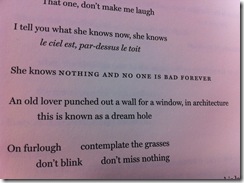#2 in the series.
I spent most of the summer reading the kind of fierce poetry that moves fearlessly into barely inhabitable breathing space three beats beyond the object that was supposed to anchor attention. A poetics of associology whose noise world sits me down in disbelief at the rare freedom of other people’s minds. Not because attention gets things right (any more than attachment guarantees love), and not because there’s always in operation productive energy that can never be tamed but because—in these poems, and for me–revolt requires curiosity, a tipping over on a verge.
I can’t remember how I heard of C. D. Wright; this book written from within incarcerated space seems to have migrated onto my desk from a lateral impulse I must have had once. People who liked this also liked. It’s been in a pile of revealed intention that I’ve been reading up and down.
Le ciel est, par-dessus le toit is one version of the commons: C.D. Wright includes it as a kind of acid irony. After all, the next line, si bleu, si calme, isn’t available as realism to the incarcerated–or the manumitted for now who swerve around aggressively while looking down at their feet, or anyone with a stomach overfull of the indigestible. I read this book and my brain clicked around over it all summer: glory hole, dream hole, peephole.
My decoupled brain collected holes. An episode of Louie begins with him in a bathroom looking at a hole in the wall captioned HEAVEN in black magic marker whose magic is not apparent to him. An older conservatively dressed white man comes in, washes his hands, and turns to insert his penis in the hole. Louis asks him, “Why would you do that?” The man says, “HEAVEN, it says right there!” Louie, after a beat: How do you know something terrible’s not going to happen to you, why would you take that risk?” The stranger: “I don’t know, you have to have faith.” The rest of the show explains why he doesn’t have faith. Not having faith is here propped on not being sucked off or sucking off, not reaching with your dick toward heaven, a rough-edged hole on the other side of which, who knows? The atmosphere of this whole series involves its fearless projectile extension of situations into the place where something might happen to interrupt the familiar’s sour reappearance. Oh it says HEAVEN, so put your dick there, because not risking is so much worse than wrapping it all up so tight in the blanket of one’s own homestyle timidity. The show goes where Louie can’t.
It’s even more intricate than this: the HEAVEN episode is followed by an episode where Louie is fellated. He has gone to a gentle dentist’s office, an office for people who fear oral penetration and care. So of course under sedation Louie dreams of convincing Osama bin Laden that he is an asshole, at the same time as his gentle dentist outside the dream is sticking his dick in Louie’s mouth, aka HEAVEN, the hole out of which all of his beautiful intelligence comes. Accepting another man’s dick in his mouth is a fantasy that moves throughout this series, in the absence of which many other things are put there, like ice cream (formless) and donuts (defined by the hole). There’s a bit where he says it’s too late in life for him to do two things: to learn to ski and to put a man’s cock in his mouth. Louie can’t admit his own swerve toward wanting to be fellating with men but he can’t not go there either, and the frankness is of a quality I can’t stop admiring. As my father used to say in Yiddish about women, he is a hole that can never be filled–in the absence of which he fills up the hole of the world. Foucault writes, “My way of being no longer the same is, by definition, the most singular part of what I am”: Louie is in between not being the same and being something else.
In this show, what would usually induce fatalism always gets another beat, another scene or two, to interrupt the hard end one more time. But as one of his friends says, he’s afraid of life. Yet the verge Louie shimmies on is the failure of the failure to thrive. He is astonished at how massively awkward he is at living. But he is desperate to not stop trying to have a style of becoming different.
Desire punches a hole in the wall. Yes it does.
In Wright’s prison poem the dream hole must mean something beautiful (attuned) about the way being revolts against being controlled: the dream hole is what you’re willing to destroy your body for if it might light up a new something to follow through to, and the question of “ultimate consequences” gets left on the side of the road. The incarcerated people Wright listens to experience the proliferation and richness of desires, in the absence of access to which they keep punching holes in the world. They get caught for the holes they punch and put up for life. The privileged usually get protected and bailed out, you know, after they punch holes in the world. And sex remains one of the main places where the aggression and desire to have a simple and chaotic pleasure, to be and to punch the hole, gets replayed as a tableau always violently underdescribed by the unambivalence of any adjective.








